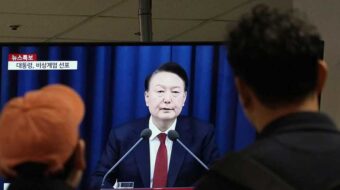Commentary
The case of accused enemy combatant Jose Padilla gets more bizarre with every passing month. Rather than being a case that would establish the government’s right to arrest even U.S. citizens on U.S. soil and imprison them forever without trial or access to an attorney, it is beginning to look like another public relations disaster for the Bush administration.
Padilla, it might be recalled, was born and raised in Chicago, acquired a police rap sheet allegedly through gang membership, eventually converted to Islam and was arrested at O’Hare International Airport in May of 2002. The government accused (but did not charge) him with being an Al Qaeda jihadist fighter, of having trained at Al Qaeda camps in Afghanistan of having planned to detonate a radioactive “dirty bomb” in a U.S. urban center.
Later, when some doubt was cast on the possibility that someone with Padilla’s background and education could actually set off a nuclear explosion, the government changed the accusation: Now they said his plan had been to open the gas vents in apartment buildings and then trigger an explosion, killing a large number of people. Even if Padilla did not have the background for atomic sabotage, any fool can blow out a pilot light, turn the gas on “high” and then activate some sort of spark.
Padilla became a legal and constitutional cause célèbre because of the government’s assertion that even though he was a U.S. citizen, he was arrested on U.S. soil, and the courts are open for business to try felony cases all over this country (so we assume Padilla could easily have been indicted if there was evidence against him), they could simply imprison him forever and not even let him have access to attorneys under the special powers that the president claims in his capacity of “commander in chief” of the war against terrorism.
Another dimension was the possibility that he would be tried by the special tribunals for “enemy combatants” that the Bush administration invented without any basis in constitutional law.
So Padilla sat in the Navy brig at Charleston, S.C., without access to lawyers or the courts, or any idea of what was going to happen to him.
But from the outside, civil liberties organizations saw the importance of the case, and began to work to get Padilla under the protections of the Constitution, i.e. into a regular courtroom where full due process protections would apply.
The implications of the government’s assertion about its rights to hold Padilla, made in May 2002, have become more and more frightening as more has been revealed about CIA torture, secret prison camps, “rendition” of suspects to countries where they can be tortured, government spying without even an attempt to get a warrant, and now the government’s assertion that the president can simply “waive” the McCain anti-torture bill if he feels like it, which means claiming the executive branch’s right to nullify statutes passed by the legislative branch and signed by the president.
People are waking up to the links between these actions, and realizing that we are coming closer to dictatorship than ever before in the history of this country. So the fight of civil libertarians on behalf of Padilla has been of utmost importance.
Things have not gone entirely the government’s way. In 2004, the Supreme Court agreed in another case, that of Yasir Hamdi, a U.S. citizen captured abroad, that the government had overreached. It did not rule on the merits of the Padilla case at that time, because of a jurisdictional technicality.
However, at that point the federal government voluntarily allowed Padilla to consult with an attorney, evidently to avoid a definitive court ruling that he had the right to one. But as the Padilla case wound its way back through the federal courts, the 4th District Court ruled in Padilla’s favor on the issue of whether the government could keep him imprisoned without trial.
Unfortunately, the Court of Appeals for the 4th District reversed this ruling. (The judge who wrote the ruling was Michael Luttig, one of Bush’s possible Supreme Court nominees.) So the thing was on the verge of being brought once more to the Supreme Court, with the danger for the government that the Supremes might rule that the Bush administration had acted unconstitutionally in holding Jose Padilla in custody for three years without even the promise of a trial by a jury of his peers. This would have not only forced the government to charge Padilla or release him, it might have served as a precedent to keep the government from doing such things to others.
So in November 2005, the government suddenly indicted Padilla in Florida and moved to take him out of the Navy brig and put him into a regular federal jail pending trial. The two most frightening accusations the government had made against Padilla, namely the dirty bomb and the gas explosions, have disappeared into thin air. He is still accused of training with Al Qaeda (and the government claims that they have an application form he filled out for this training in 2000) and of planning to give material aid to terrorism and kill Americans.
One theory is that the information on which the scarier accusations were based had in fact been extracted by torture from Al Qaeda figures held in U.S. or allied custody, and therefore could not under any circumstances be presented in court, where they would not only not hold up, but would add to the torture scandal.
The Appeals Court at first tried to prevent the move from the Navy brig, perhaps suspecting that this was nothing but a maneuver to prevent the Supreme Court from ruling on the constitutional issue and thus setting a precedent. However, the Supreme Court has now allowed the move to go ahead, and Padilla (plus three other people) have been indicted. Padilla has entered a plea of “not guilty,” but the judge denied bail.
Never a dull moment in the bizarre world of George W. Bush’s “justice.”









